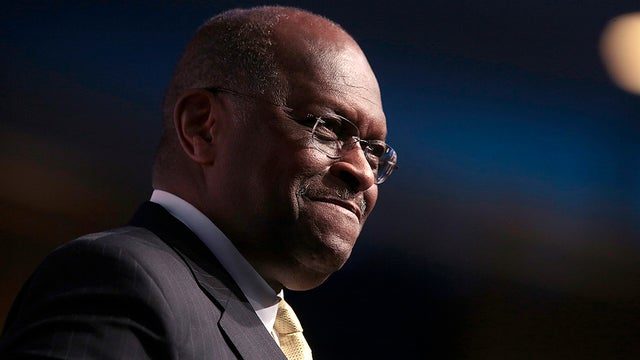Associated Press
ATLANTA (AP) — Herman Cain, former Republican presidential candidate and former CEO of a major pizza chain who went on to become an ardent supporter of President Donald Trump, has died of complications from the coronavirus. He was 74.
A post on Cain’s Twitter account on Thursday announced the death. Cain had been ill with the virus for several weeks. It’s not clear when or where he was infected, but he was hospitalized less than two weeks after attending Trump’s campaign rally in Tulsa, Oklahoma, in June. Cain had been co-chair of Black Voices for Trump.
“We knew when he was first hospitalized with COVID-19 that this was going to be a rough fight,” read an article posted on the Twitter account. “He had trouble breathing and was taken to the hospital by ambulance. We all prayed that the initial meds they gave him would get his breathing back to normal, but it became clear pretty quickly that he was in for a battle.”
Cain, who had hoped to become the first Black to win the GOP nomination, was initially considered a long-shot candidate. His bid was propelled forward in September 2011 when he won a straw poll vote in Florida, instantly becoming an alternative candidate for Republican voters concerned that former Massachusetts Gov. Mitt Romney was not conservative enough.
But Cain struggled to respond to accusations that he had sexually harassed several women and — in a video that went viral on the Internet — rambled uncomfortably when asked whether he supported or opposed President Barack Obama’s policies in Libya. There were also gaffes on abortion and torture that led Cain’s critics to question whether he was ready for the White House.
Just as Cain started surging in the polls, Politico reported that the National Restaurant Association paid settlements to two former employees who claimed Cain sexually harassed them while he was CEO and president of the lobbying group from 1996 to 1999. Another woman, Sharon Bialek, said that Cain, an acquaintance, groped her in a car in July 1997 after they’d had dinner in Washington. Bialek, who was then unemployed, said she had contacted Cain seeking job advice.
Cain said he could not remember Bialek and denied sexually harassing anyone.
“I don’t even know who this woman is,” Cain said during a news conference in Arizona that he called to quell the controversy. “I tried to remember if I recognized her and I didn’t.”
Polls in the weeks afterward showed Cain’s popularity had slipped considerably.
Cain honed his speaking skills in the corporate world, then hosted a radio talk show in Atlanta that introduced his political views and up-by-the-bootstraps life story to many Tea Party supporters and other conservatives.
But he repeatedly fumbled under the scrutiny that follows a front-runner for the presidency. He gave a rambling response when asked by the editorial board of the Milwaukee Journal Sentinel whether he supported or opposed Obama’s policies in Libya. The videotaped interview went viral on the internet.
He first ventured into national politics in 1994 when he publicly challenged President Bill Clinton, a Democrat, on his proposal to force employers to buy health insurance for their employees. “For many, many businesses like mine, the cost of your plan is simply a cost that will cause us to eliminate jobs,” Cain told Clinton. “What will I tell those people whose jobs I will have to eliminate?”
Afterward, the restaurant industry used Cain as a spokesman as it campaigned against Clinton’s plan, which ultimately failed.
Cain served as a director of the Federal Reserve Bank of Kansas City from 1992 to 1996. His colleagues said they believed he left the nonpartisan board so he could be more active politically.
“We were already among ourselves as directors having discussions and kidding him about running for president,” said Jo Marie Dancik, who served on the board with Cain. “We were serious. He laughed it off at that point. I think it was probably the first time he had every really considered.”
Cain moved back to his native Georgia and in 2004 ran for U.S. Senate as a Republican. He lost to Rep. Johnny Isakson in the primary.
Less than two years later, Cain was diagnosed with late-stage cancer in his colon that had spread to his liver. He recovered and later said he believed his survival showed that God had other plans for him. He credited God with persuading him to run for president after Obama, a Democrat, took office in early 2009.
“That’s when I prayed and prayed and prayed. I’m a man of faith — I’ve had to do a lot of praying for this one,” Cain told an audience of young Republicans in Atlanta. “More praying than I’ve ever done before in my life. And when I finally realized that it was God saying that this is what I needed to do, I was like Moses. ‘You’ve got the wrong man, Lord. Are you sure?’”
Cain projected a self-confident image that at times bordered on arrogance. He referred to himself in the third person. His motivations speaking company was named T.H.E. New Voice Inc. The acronym stood for The Hermanator Experience.
His run for the presidency was unlikely, considering his origins. Born in the segregated South, Cain joked that his family was so poor it was “po.” His father worked three jobs as a janitor, barber and chauffeur, while his mother was a servant. He graduated from Morehouse College, a historically black college for men in Atlanta, received a master’s degree from Purdue University and worked as a civilian mathematician in the U.S. Navy.
While it was a good job, Cain said his ambitions were in the corporate world. He wanted to be president of “something … somewhere,” he later wrote.
He worked first for Coca-Cola, became a vice president with Pillsbury, then was appointed to run its struggling Burger King unit in the Philadelphia area. His success prompted Pillsbury officials to ask Cain to take over its floundering Godfather’s Pizza chain. Cain said he returned the franchise to profitability. One of his strategies was shuttering under-performing stores.
Cain is survived by his wife, Gloria Etchison, their children and grandchildren.
The centerpiece of Cain’s campaign was his 9-9-9 plan, which would have replaced the current tax code with a 9% tax on personal and corporate income and a 9% national sales tax. Cain said the plan’s simplicity would stimulate the economy by giving investors certainty. A Baptist preacher who made money giving motivational speeches, Cain had a talent for selling his ideas to conservative audiences with a straightforward style.
“If 10% is good enough for God, 9% ought to be good enough for the federal government,” he told crowds.
Acknowledging Cain’s death in a tweet Thursday, Romney wrote, “Saddened that Herman Cain—a formidable champion of business, politics and policy—has lost his battle with Covid. St. Peter will soon hear ‘999!’ Keep up the fight, my friend.”





